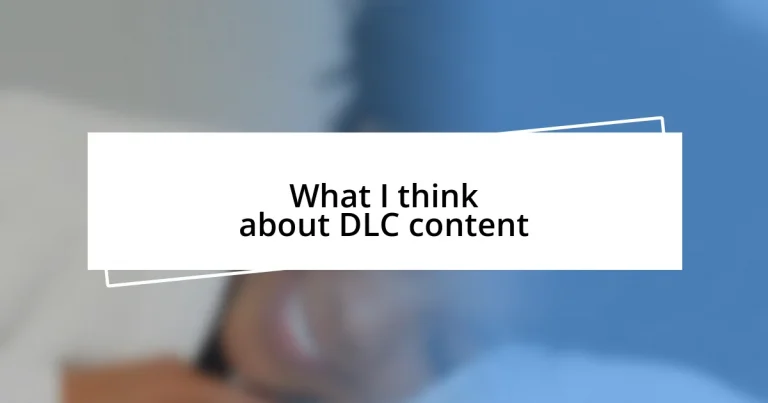Key takeaways:
- DLC enhances gaming experiences by offering additional content, new narratives, and fostering community engagement.
- While some DLCs provide substantial value, others are criticized for their pricing and for locking core content behind paywalls, leading to player frustration.
- The future of DLC may focus on meaningful storytelling, free updates, and community-driven content, aiming for a better balance with base games and maintaining player trust.
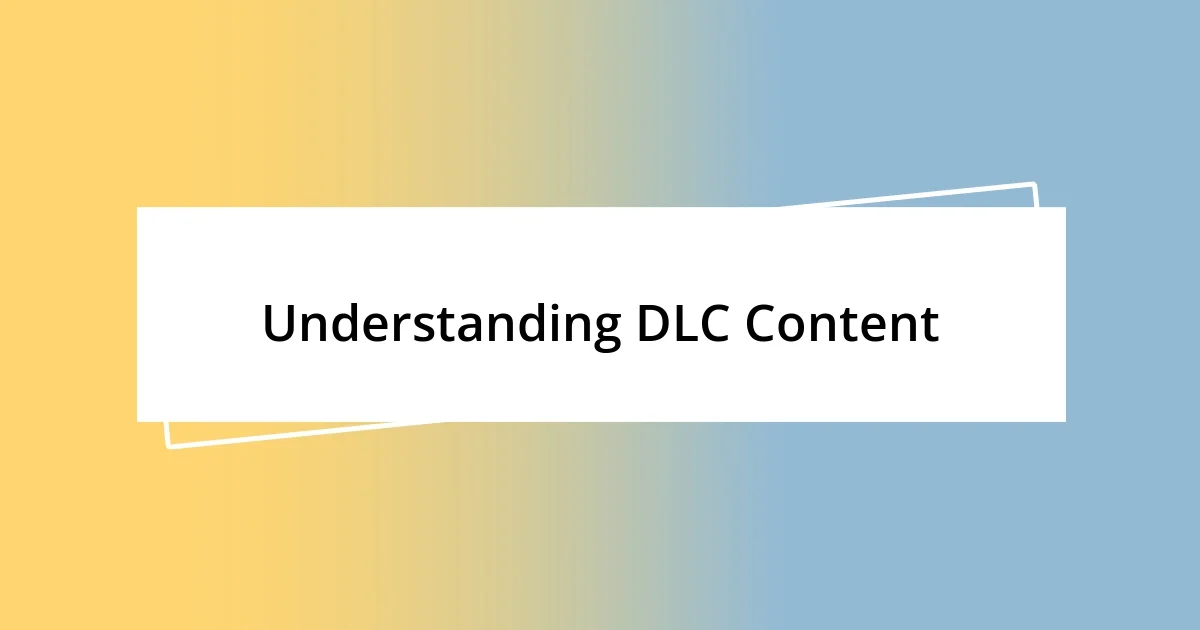
Understanding DLC Content
DLC, or downloadable content, has transformed how we experience video games. I remember the thrill when I downloaded my first DLC for a favorite game; it felt like rediscovering an old friend. It’s fascinating how these expansions can enrich a game, adding new characters, levels, or even storylines that feel like secret pathways waiting to be explored.
I’ve noticed that not all DLC is created equal. Sometimes, I find myself scratching my head, wondering, “Was this worth the extra cost?” There are gems that deepen the narrative and provide hours of enjoyment, while others can feel like cash grabs, making me question the intention behind the offering. It can be a bit of a gamble, but I believe that well-crafted DLC can elevate our overall gaming experience.
Moreover, DLC often fosters a sense of community within the gaming world. I often engage with fellow gamers who share their experiences after a new DLC drops, and it’s incredible how it sparks conversations and excitement. Do you recall a time when a DLC changed your perspective on a game? For me, it’s those shared moments that remind me of the joy and connection that gaming can bring, even beyond the initial release.
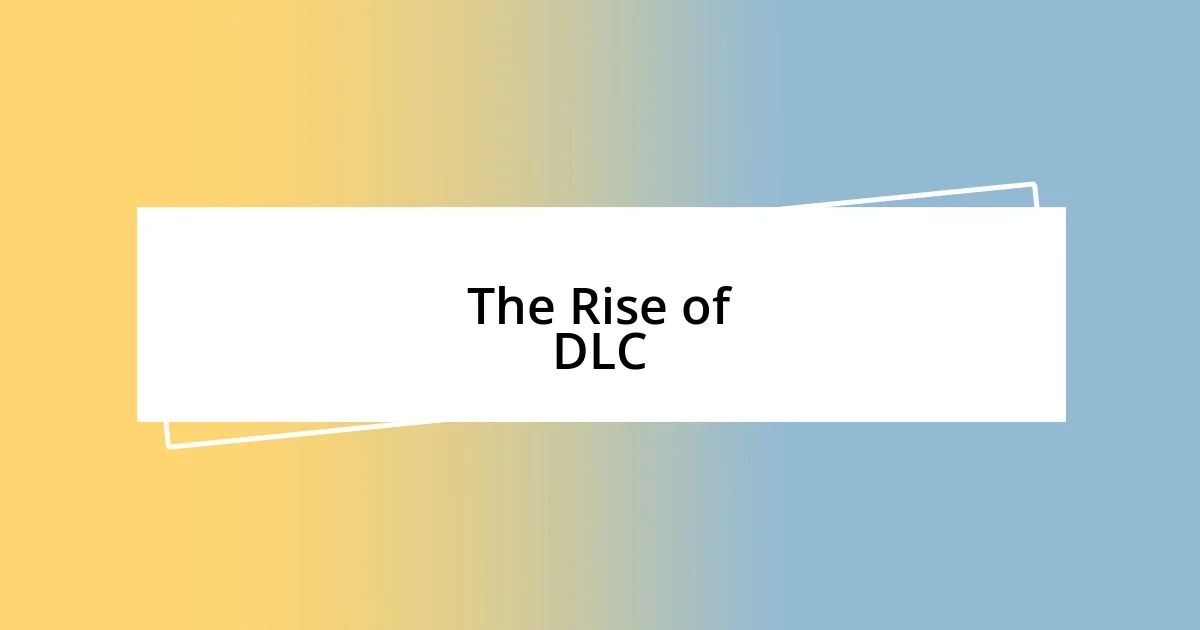
The Rise of DLC
The rise of DLC began as a response to the growing appetite for more content among gamers. I still remember when developers started offering additional chapters for existing games, and it felt revolutionary. It wasn’t just an update; it was a reinvention of the experience itself. Suddenly, I could dive back into worlds I loved, discovering fresh narratives and challenges.
- Expands the lifespan of games, keeping players engaged longer.
- Offers new experiences for devoted fans without requiring a complete sequel.
- Allows developers to explore creative concepts that may not fit in the original game.
- Can be a source of additional revenue, incentivizing developers to create high-quality expansions.
Lately, it seems like every major title has some form of DLC. Sometimes, I can’t help but feel nostalgic about the days when a game was a complete package. Yet, seeing my favorite titles expand and evolve keeps me coming back for more.
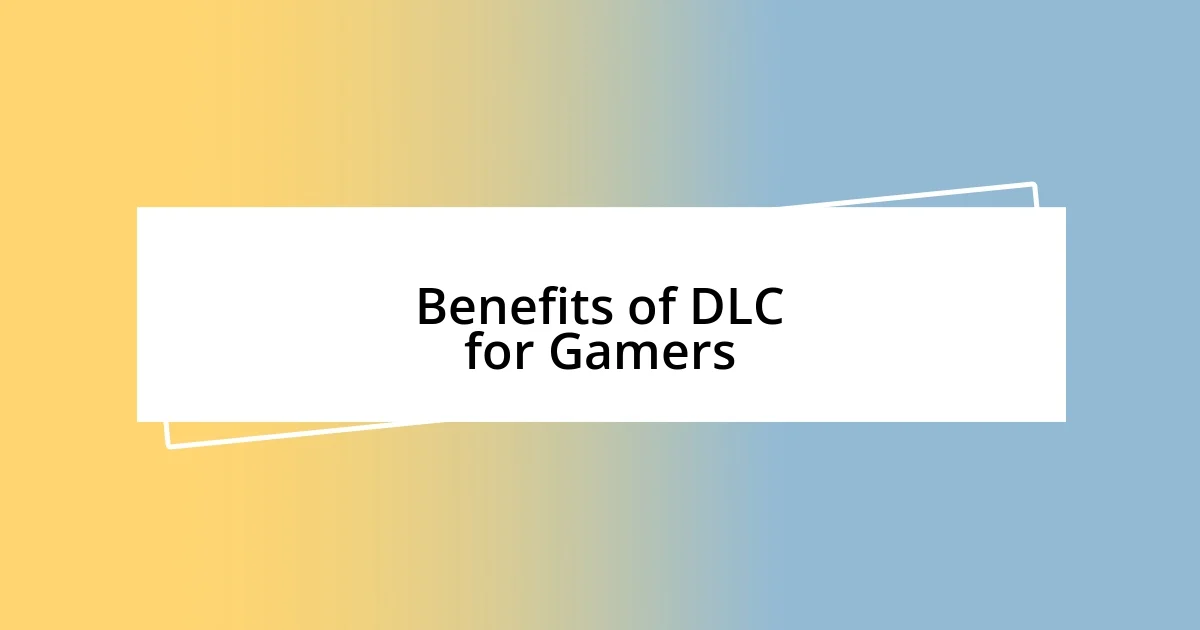
Benefits of DLC for Gamers
DLC offers countless benefits to gamers, enhancing our favorite titles well beyond their initial launch. I recall diving back into a classic game after the release of a highly anticipated DLC and feeling a rush of adrenaline as I immersed myself in new quests. This kind of fresh content can breathe new life into games we thought we had fully explored, making them feel relevant again. With each update, there’s an opportunity to develop new strategies, face unexpected challenges, and even uncover hidden Easter eggs that keep the gameplay exciting.
One of the most significant advantages of DLC is the way it allows for tailored experiences based on player preferences. I’ve often found myself gravitating towards specific DLC packs that cater to my gaming style, whether it’s more story-driven content, character customization, or intense multiplayer maps. This feeling of choice fosters deeper connections with the games I love, making each experience feel personal. It’s as though the developers are saying, “We see you and what you enjoy, and here’s more of it.”
Furthermore, many gamers, including myself, find that DLC enriches our overall gaming communities. I can’t tell you how many times I’ve joined forums or chats buzzing with excitement over new releases, sharing strategies and opinions after trying out the latest content. It feels wonderful to be part of a larger experience, and DLC plays a crucial role in creating this sense of togetherness, allowing us all to engage in conversations about what we love and what we wish for next.
| Benefits of DLC | Details |
|---|---|
| Extended Gameplay | Allows players to revisit and relive their favorite games, making them feel new again. |
| Personalization | Offers players options to customize their experience, catering to individual play styles. |
| Community Engagement | Fosters conversation and connection among gamers, creating a shared culture around titles. |
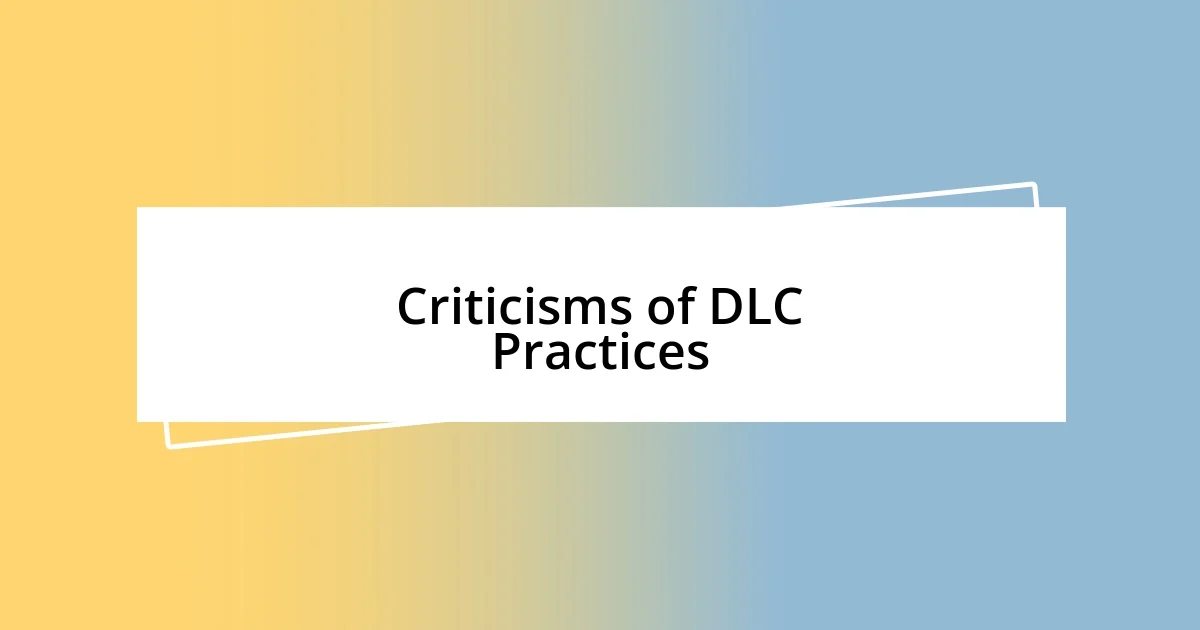
Criticisms of DLC Practices
Critics often point to the rising cost of DLC as a concerning trend in the gaming industry. I’ve noticed how sometimes these expansions can feel overpriced, especially when they offer less content than expected. It leaves me wondering: should I really be shelling out extra for a few hours of gameplay?
Moreover, the practice of locking core content behind paywalls can feel disheartening. I remember playing a popular title, only to discover that significant story elements were gated and accessible only through a DLC purchase. It made me question whether the developers were prioritizing profits over the player experience, and that’s a tough pill to swallow.
There’s also a worry that the focus on DLC can lead to incomplete games upon initial release. I’ve experienced this firsthand—picking up a game day one, only to find that vital features were promised as future expansions. It makes you wonder: are we paying full price for an unfinished product? Such practices can really shatter the joy of anticipation I used to feel when buying a new game.
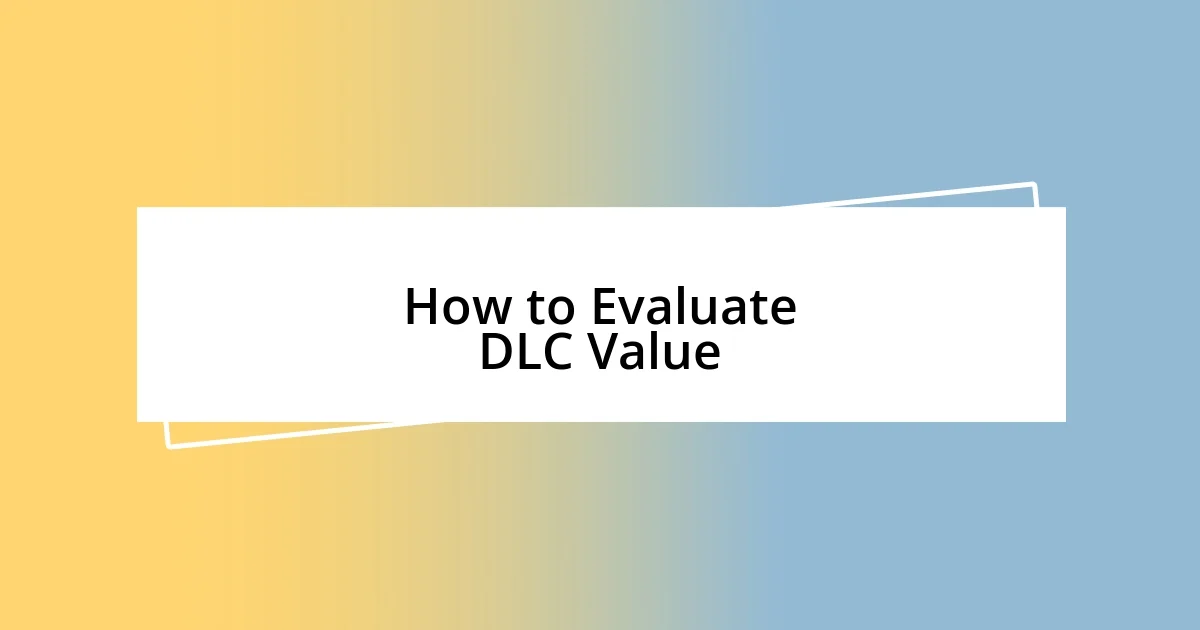
How to Evaluate DLC Value
When evaluating the value of DLC, I always find it crucial to consider the amount of content provided versus the price tag. I recall purchasing a DLC for a beloved game, only to realize that it included just a couple of missions and a few new outfits. It left me wondering whether this was worth my hard-earned money. I think it’s essential to look for DLC that offers substantial gameplay, like new maps, in-depth storylines, or extended character arcs. Otherwise, it may just feel like a way for developers to cash in on our passion.
Another important factor is how the DLC fits into the overall game narrative or experience. There have been times when I’ve played through an expansion, only to find it didn’t mesh well with the existing storyline. I remember playing a much-anticipated DLC for an RPG and being disappointed at how disjointed it felt from the main plot. Evaluating how well the content integrates can make a massive difference in whether the purchase feels justified.
Lastly, community feedback plays a significant role in my evaluation process. I often check forums and reviews before making a decision—sharing my thoughts about DLC experiences makes them feel more dynamic and engaging. Not too long ago, I saw a lot of buzz around a new DLC pack that promised an immersive experience. The enthusiastic reviews gave me confidence that my investment would be worthwhile, validating my excitement for what was ahead. In the end, it’s about ensuring that the content resonates, not just with me personally, but also with the gaming community as a whole.
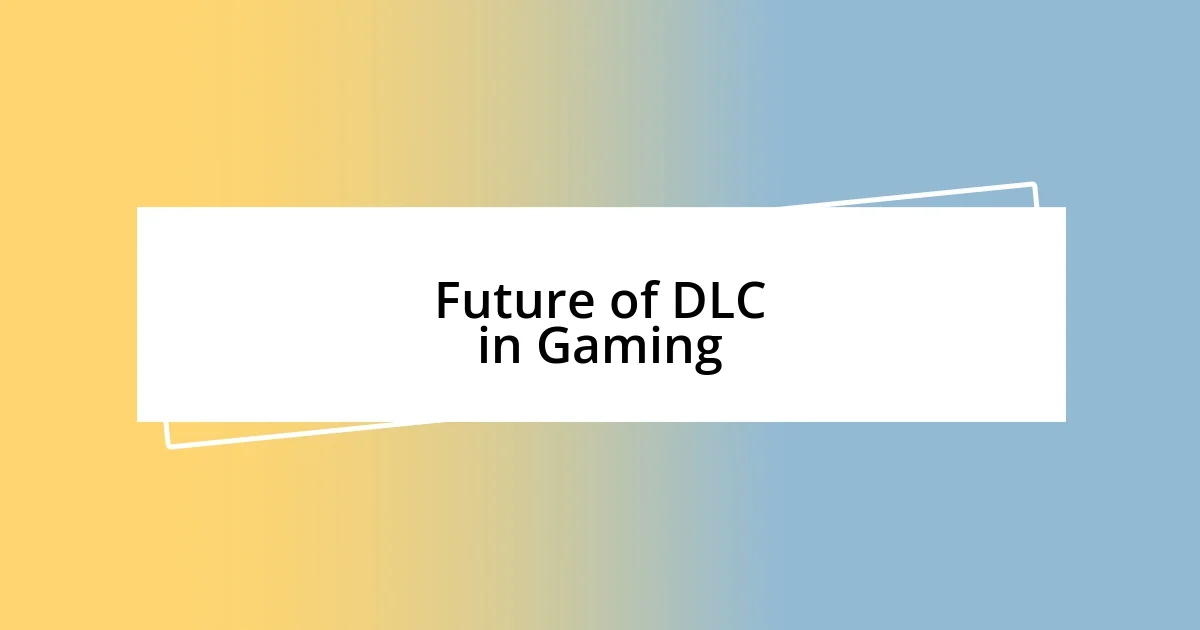
Future of DLC in Gaming
There’s so much potential in the future of DLC, and I can see it shifting towards more meaningful content. Imagine developers creating story-driven expansions that feel like additional chapters in a beloved book. I remember when a DLC for a game I adored added a whole new storyline, and it genuinely felt like I was uncovering hidden depths of the characters. This raises an interesting question: how will developers ensure that future DLC captures that same magic?
Another trend I’m noticing is the rise of free updates and seasonal content, which can complement the full game experience without breaking the bank. I once participated in a game that introduced new characters and events every month without charging additional fees, and it deepened my engagement. It made me feel appreciated as a player and showed me that there’s a commitment to community rather than just profit. This approach cultivates a dedicated player base, which seems to be increasingly important in today’s gaming landscape.
Looking forward, I’m also curious if we’ll see more interactive and community-driven DLC experiences. What if players could vote on the types of expansions they wanted to see? I can imagine the excitement of being part of that decision-making process. When I’ve seen developers actively engaging with their fans, it’s created a sense of belonging and ownership, which is crucial in this era of gaming. The future of DLC has the potential to not only enhance gameplay but to create stronger bonds within the community, and I can’t wait to see how that unfolds.
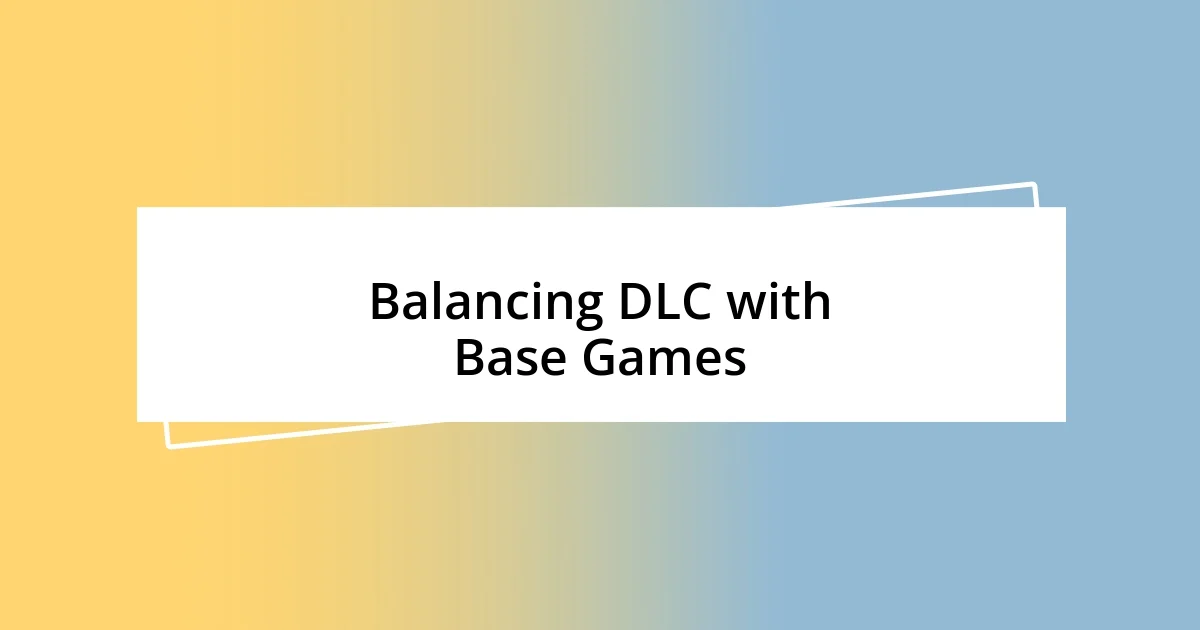
Balancing DLC with Base Games
Balancing DLC with base games is often a tightrope walk. I vividly recall a time when I dove into a new expansion that introduced exciting gameplay elements but felt wildly unbalanced with the existing game mechanics. It made me question whether the developers had effectively tested how the DLC meshed with the core game. Have you ever experienced a similar frustration—when an add-on seems to tip the scales away from fairness? It’s certainly something I hope we see improved in future releases.
There’s also the aspect of maintaining player investment. I remember eagerly waiting for a DLC that promised to weave itself seamlessly into the base game’s storyline, only to find that it felt more like an afterthought. This leaves players with a sense of disconnect. How can developers strike that perfect balance between enriching the main story and not overloading it with content that feels tacked on? Personally, I believe that thoughtful integration is key; meaningful additions can keep players emotionally invested while also providing fresh experiences.
Lastly, the pricing structure often dictates how well DLC is received. I’ve encountered scenarios where I felt that the price didn’t align with the content’s value. It’s a frustrating feeling to spend your hard-earned cash on something that feels underwhelming. Can you relate to that? I think it’s essential for developers to consider both the quantity and quality of content offered in relation to the base game. When the balance is just right, it not only enhances the overall experience but also fosters trust between players and developers.












